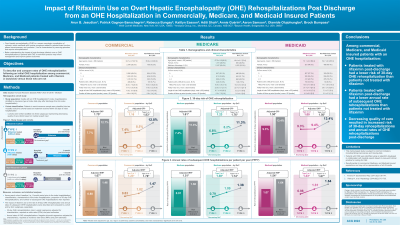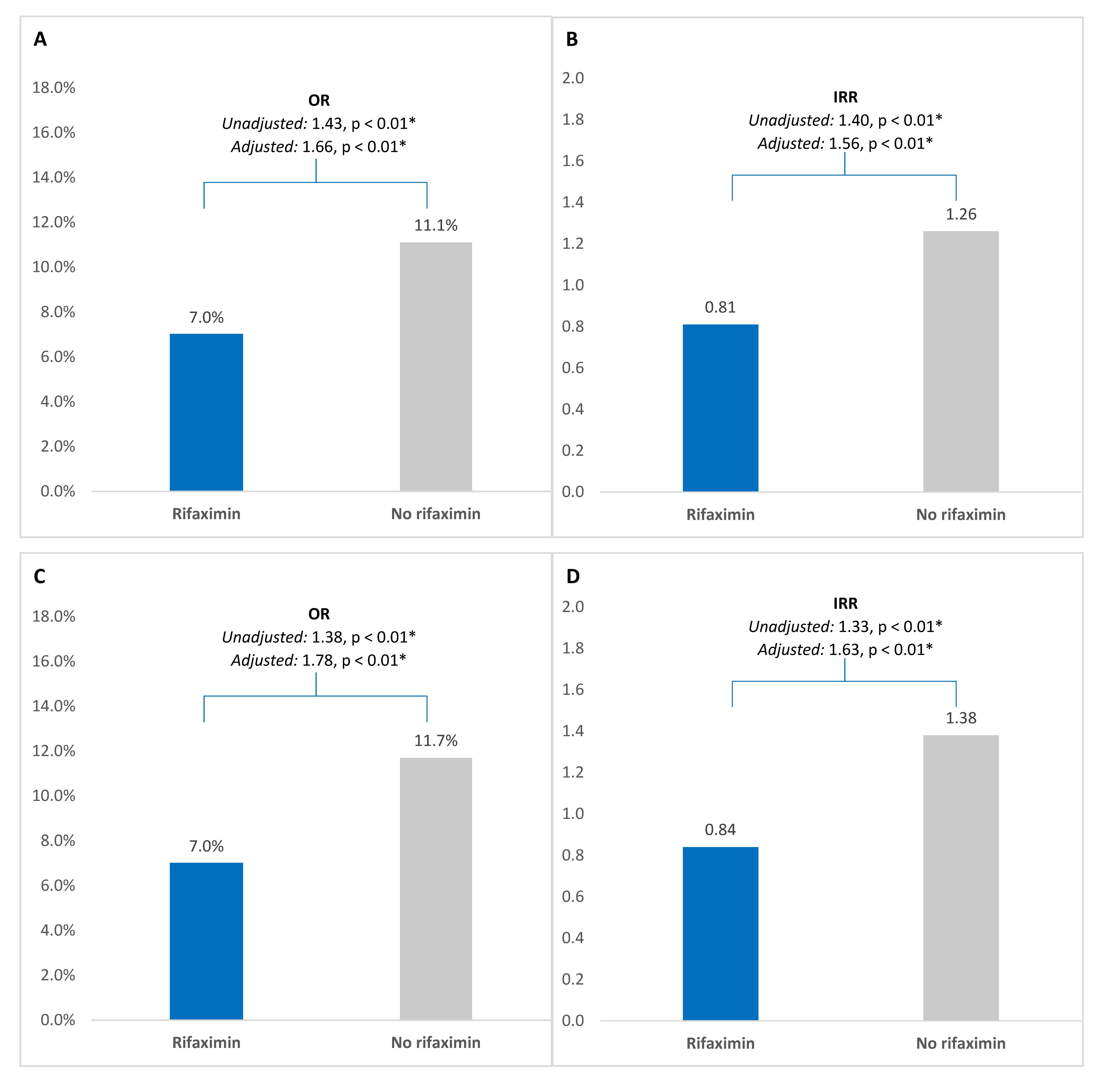Sunday Poster Session
Category: Liver
P1162 - Impact of Rifaximin Use on Overt Hepatic Encephalopathy (OHE) Rehospitalizations Post-Discharge From an OHE Hospitalization in Commercially and Medicare-Insured Patients
Sunday, October 27, 2024
3:30 PM - 7:00 PM ET
Location: Exhibit Hall E

Has Audio

Arun B. Jesudian, MD
Weill Cornell Medicine
New York, NY
Presenting Author(s)
Arun B.. Jesudian, MD1, Patrick Gagnon-Sanschagrin, MSc2, Rebecca Bungay, MSc2, Kaitlyn Easson, PhD2, Aditi Shah, MA2, Annie Guérin, MSc2, Aaron Samson, PharmD3, Olamide Olujohungbe, PharmD3, Brock Bumpass, PharmD3
1Weill Cornell Medicine, New York, NY; 2Analysis Group, Inc., Montreal, PQ, Canada; 3Bausch Health, Bridgewater, NJ
Introduction: Overt hepatic encephalopathy (OHE) is a life-threatening neurologic complication of cirrhosis with a large medical resource burden. Patients with OHE often experience recurring episodes that require rehospitalization, further adding to patient morbidity. Therefore, it is imperative to better understand the impact of post-discharge rifaximin use on OHE rehospitalizations in patients with OHE in the US.
Methods: Claims data from Komodo Research Dataset (1/2016 - 9/2023) were used to identify commercial and Medicare patients with an initial OHE hospitalization. Separately for each insurance sample, patients were classified into 2 mutually exclusive cohorts based on treatment received within 30 days of index hospitalization discharge: rifaximin (± lactulose) cohort or no rifaximin cohort. The impact of rifaximin use on 30-day OHE rehospitalization risk and annual OHE hospitalization rates was compared between cohorts (adjusted for patient characteristics).
Results: In the commercial sample, 6309 and 4381 patients were included in the rifaximin and no rifaximin cohorts, respectively. Mean age was 54.5 (rifaximin) and 53.7 (no rifaximin) years; 39.5% and 44.6% were female. In each cohort, 584 (9.3%; rifaximin) and 326 (7.4%; no rifaximin) patients had MELD-Na scores, with a mean score of 17.3 and 17.1, respectively. After an initial OHE hospitalization, the 30-day OHE rehospitalization risk (11.1 vs 7.0%; adjusted odds ratio [OR] 1.66; Figure A) and annual OHE hospitalization rate (1.26 vs 0.81; adjusted incidence rate ratio [IRR] 1.56, both p < 0.01; Figure B) were higher for the no rifaximin vs rifaximin cohort. In the Medicare sample, 2779 and 3713 patients were included in the rifaximin (89.3% Medicare Advantage) and no rifaximin cohorts (92.6% Medicare Advantage), respectively. Mean age was 67.7 (rifaximin) and 69.3 (no rifaximin) years; 49.8% and 47.9% were female. In each cohort, 434 (15.6%; rifaximin) and 414 (11.2%; no rifaximin) patients had MELD-Na scores, with a mean score of 15.1 and 14.4, respectively. After an initial OHE hospitalization, the 30-day OHE rehospitalization risk (11.7 vs 7.0%; adjusted OR 1.78; Figure C) and annual OHE hospitalization rate (1.38 vs 0.84; adjusted IRR 1.63, both p < 0.01; Figure D) were higher for the no rifaximin vs rifaximin cohort.
Discussion: Timely initiation of rifaximin post-discharge was associated with reduced risk of 30-day rehospitalization and lower annualized rehospitalization rates in both commercially and Medicare insured patients.

Disclosures:
Arun B.. Jesudian, MD1, Patrick Gagnon-Sanschagrin, MSc2, Rebecca Bungay, MSc2, Kaitlyn Easson, PhD2, Aditi Shah, MA2, Annie Guérin, MSc2, Aaron Samson, PharmD3, Olamide Olujohungbe, PharmD3, Brock Bumpass, PharmD3. P1162 - Impact of Rifaximin Use on Overt Hepatic Encephalopathy (OHE) Rehospitalizations Post-Discharge From an OHE Hospitalization in Commercially and Medicare-Insured Patients, ACG 2024 Annual Scientific Meeting Abstracts. Philadelphia, PA: American College of Gastroenterology.
1Weill Cornell Medicine, New York, NY; 2Analysis Group, Inc., Montreal, PQ, Canada; 3Bausch Health, Bridgewater, NJ
Introduction: Overt hepatic encephalopathy (OHE) is a life-threatening neurologic complication of cirrhosis with a large medical resource burden. Patients with OHE often experience recurring episodes that require rehospitalization, further adding to patient morbidity. Therefore, it is imperative to better understand the impact of post-discharge rifaximin use on OHE rehospitalizations in patients with OHE in the US.
Methods: Claims data from Komodo Research Dataset (1/2016 - 9/2023) were used to identify commercial and Medicare patients with an initial OHE hospitalization. Separately for each insurance sample, patients were classified into 2 mutually exclusive cohorts based on treatment received within 30 days of index hospitalization discharge: rifaximin (± lactulose) cohort or no rifaximin cohort. The impact of rifaximin use on 30-day OHE rehospitalization risk and annual OHE hospitalization rates was compared between cohorts (adjusted for patient characteristics).
Results: In the commercial sample, 6309 and 4381 patients were included in the rifaximin and no rifaximin cohorts, respectively. Mean age was 54.5 (rifaximin) and 53.7 (no rifaximin) years; 39.5% and 44.6% were female. In each cohort, 584 (9.3%; rifaximin) and 326 (7.4%; no rifaximin) patients had MELD-Na scores, with a mean score of 17.3 and 17.1, respectively. After an initial OHE hospitalization, the 30-day OHE rehospitalization risk (11.1 vs 7.0%; adjusted odds ratio [OR] 1.66; Figure A) and annual OHE hospitalization rate (1.26 vs 0.81; adjusted incidence rate ratio [IRR] 1.56, both p < 0.01; Figure B) were higher for the no rifaximin vs rifaximin cohort. In the Medicare sample, 2779 and 3713 patients were included in the rifaximin (89.3% Medicare Advantage) and no rifaximin cohorts (92.6% Medicare Advantage), respectively. Mean age was 67.7 (rifaximin) and 69.3 (no rifaximin) years; 49.8% and 47.9% were female. In each cohort, 434 (15.6%; rifaximin) and 414 (11.2%; no rifaximin) patients had MELD-Na scores, with a mean score of 15.1 and 14.4, respectively. After an initial OHE hospitalization, the 30-day OHE rehospitalization risk (11.7 vs 7.0%; adjusted OR 1.78; Figure C) and annual OHE hospitalization rate (1.38 vs 0.84; adjusted IRR 1.63, both p < 0.01; Figure D) were higher for the no rifaximin vs rifaximin cohort.
Discussion: Timely initiation of rifaximin post-discharge was associated with reduced risk of 30-day rehospitalization and lower annualized rehospitalization rates in both commercially and Medicare insured patients.

Figure: Comparison between the rifaximin and no rifaximin cohorts of (A) 30-day risk of OHE rehospitalization and (B) annual OHE hospitalization rate in the commercial sample and (C) 30-day risk of OHE rehospitalization and (D) annual OHE hospitalization rate in the Medicare sample.
*Significant at the 5% level.
IRR: incidence rate ratio; OHE: overt hepatic encephalopathy; OR: odds ratio.
*Significant at the 5% level.
IRR: incidence rate ratio; OHE: overt hepatic encephalopathy; OR: odds ratio.
Disclosures:
Arun Jesudian: Bausch Health – Consultant. Madrigal Pharmaceuticals – Speakers Bureau. Novo Nordisk – Advisor or Review Panel Member, Consultant. Orphalan – Advisor or Review Panel Member, Consultant. Salix Pharmaceuticals – Consultant, Speakers Bureau.
Patrick Gagnon-Sanschagrin: Analysis Group, Inc. – Employee of Analysis Group, Inc., a consulting company that provided paid consulting services to Bausch Health (funder of this study).
Rebecca Bungay: Analysis Group, Inc. – Employee of Analysis Group, Inc., a consulting company that provided paid consulting services to Bausch Health (funder of this study).
Kaitlyn Easson: Analysis Group, Inc. – Employee of Analysis Group, Inc., a consulting company that provided paid consulting services to Bausch Health (funder of this study).
Aditi Shah: Analysis Group, Inc. – Employee of Analysis Group, Inc., a consulting company that provided paid consulting services to Bausch Health (funder of this study).
Annie Guérin: Analysis Group, Inc. – Employee of Analysis Group, Inc., a consulting company that provided paid consulting services to Bausch Health (funder of this study).
Aaron Samson: Bausch Health – Employee.
Olamide Olujohungbe: Bausch Health – Employee, Stock-publicly held company(excluding mutual/index funds).
Brock Bumpass: Bausch Health – Employee, Stock-publicly held company(excluding mutual/index funds).
Arun B.. Jesudian, MD1, Patrick Gagnon-Sanschagrin, MSc2, Rebecca Bungay, MSc2, Kaitlyn Easson, PhD2, Aditi Shah, MA2, Annie Guérin, MSc2, Aaron Samson, PharmD3, Olamide Olujohungbe, PharmD3, Brock Bumpass, PharmD3. P1162 - Impact of Rifaximin Use on Overt Hepatic Encephalopathy (OHE) Rehospitalizations Post-Discharge From an OHE Hospitalization in Commercially and Medicare-Insured Patients, ACG 2024 Annual Scientific Meeting Abstracts. Philadelphia, PA: American College of Gastroenterology.
